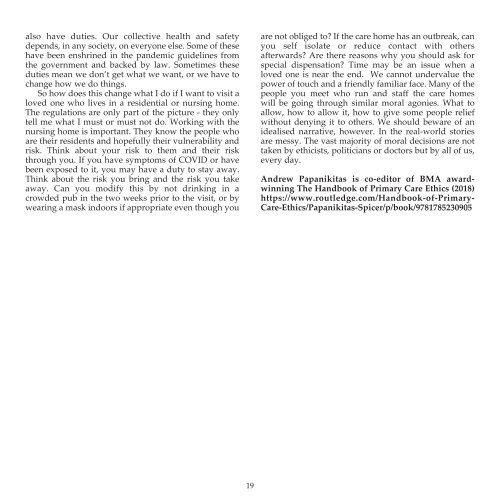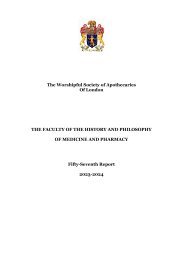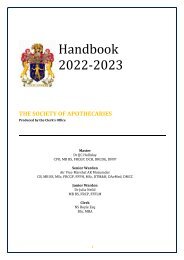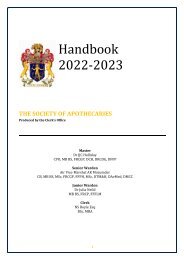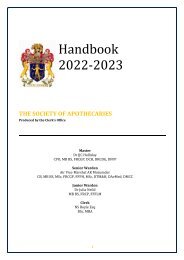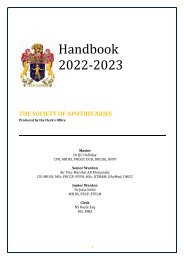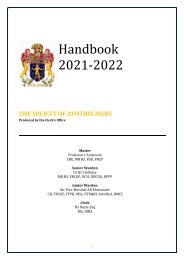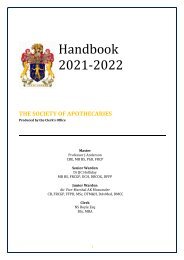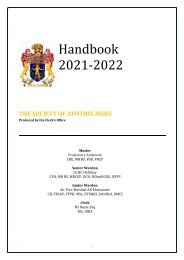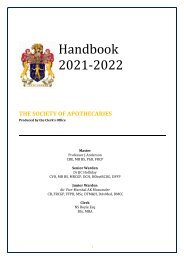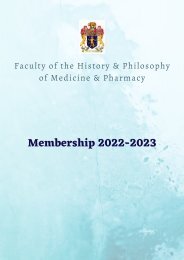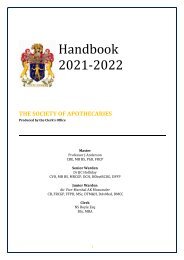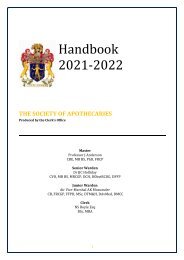Apothecary 2020
Journal of the Worshipful Society of Apothecaries for Master's Year 2019-20
Journal of the Worshipful Society of Apothecaries for Master's Year 2019-20
You also want an ePaper? Increase the reach of your titles
YUMPU automatically turns print PDFs into web optimized ePapers that Google loves.
also have duties. Our collective health and safety<br />
depends, in any society, on everyone else. Some of these<br />
have been enshrined in the pandemic guidelines from<br />
the government and backed by law. Sometimes these<br />
duties mean we don’t get what we want, or we have to<br />
change how we do things.<br />
So how does this change what I do if I want to visit a<br />
loved one who lives in a residential or nursing home.<br />
The regulations are only part of the picture - they only<br />
tell me what I must or must not do. Working with the<br />
nursing home is important. They know the people who<br />
are their residents and hopefully their vulnerability and<br />
risk. Think about your risk to them and their risk<br />
through you. If you have symptoms of COVID or have<br />
been exposed to it, you may have a duty to stay away.<br />
Think about the risk you bring and the risk you take<br />
away. Can you modify this by not drinking in a<br />
crowded pub in the two weeks prior to the visit, or by<br />
wearing a mask indoors if appropriate even though you<br />
are not obliged to? If the care home has an outbreak, can<br />
you self isolate or reduce contact with others<br />
afterwards? Are there reasons why you should ask for<br />
special dispensation? Time may be an issue when a<br />
loved one is near the end. We cannot undervalue the<br />
power of touch and a friendly familiar face. Many of the<br />
people you meet who run and staff the care homes<br />
will be going through similar moral agonies. What to<br />
allow, how to allow it, how to give some people relief<br />
without denying it to others. We should beware of an<br />
idealised narrative, however. In the real-world stories<br />
are messy. The vast majority of moral decisions are not<br />
taken by ethicists, politicians or doctors but by all of us,<br />
every day.<br />
Andrew Papanikitas is co-editor of BMA awardwinning<br />
The Handbook of Primary Care Ethics (2018)<br />
https://www.routledge.com/Handbook-of-Primary-<br />
Care-Ethics/Papanikitas-Spicer/p/book/9781785230905<br />
19


